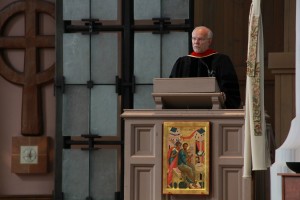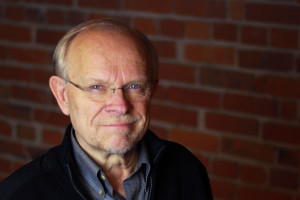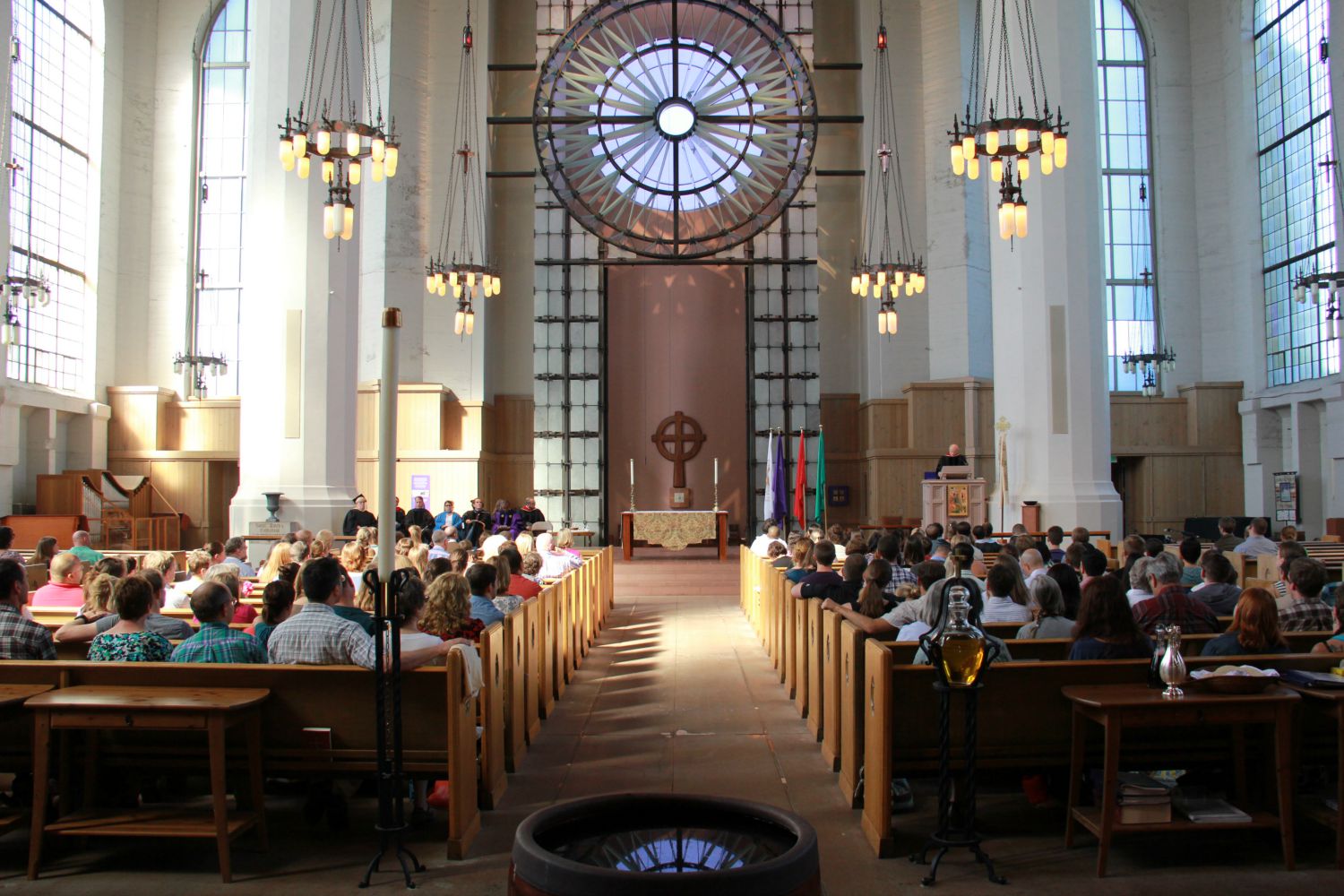The Seattle School community gathered for Convocation at St. Mark’s Cathedral on September 5. The annual ceremony formally marks the matriculation of the incoming cohort and invites the entire community to reaffirm our commitments to God, to each other, and to our work at The Seattle School. Dr. Keith Anderson, President, delivered the following Convocation message, exploring the faith and commitment to scripture that is at the heart of The Seattle School’s mission.
Ansel Adams once described photography as “the poetry of the real.” As an aspiring photographer, I have had moments when I think I understand those words. A photograph is not merely a snapshot for the sake of a memory; it is something more like an encounter with something alive—a perception of a presence—what we can even call a communion. The arts insist on that way of seeing: we set out alert for encounter. We pay attention to a universe that has something to say. If we only visualize life as a random chronology, then poetry is banal and all texture is flattened into a single dimension in which we no longer see with spiritual eyes.
Someone I love has macular degeneration and glaucoma, both. Her visual acuity has narrowed, shrinking almost weekly it seems. Her ability to see with her eyes is passing away as the twin diseases take over her sight. What she would give almost anything for, we take for granted, the rest of us: to see faces, the sunset, a smile or the eyes of her great grandsons. If we conclude that life is flat and narrow, pre-determined and already defined, closed and shut-in, there is little point in poetry, photography, story, the arts, or spirituality. We’re left with facts and the expected; we’re left with people but not a living universe; we’re left with data but not with the God who still just might have something to say.
I choose, instead, to go where it seems fewer want to go today. I prefer to hold open faith that a luminous presence might appear, a whisper from beyond time might be heard, and a presence might burst upon us. I prefer to live in what we might call the vicinity of the Spirit—nearby, close; the kingdom that is already here and yet to come. The reason to be in this room today is that you too believe in such consonance or have hope that it might be found.
 “There is a communion,” I heard someone say. It is present to us in “the poetry of the real,” what I want to call the story to be investigated, explored, and met in conversation of soul—we go deep because we believe something, no, someone larger than ourselves inhabits the story. Where biblical vocabulary names the Holy Spirit as present and speaking, seen and heard, we might also speak of our longing, yearning, going home, seeking, and being welcomed. I don’t mean to imply a reduced humanist version of the experience of God or to deny the ecstatic some have known. I only wish to say that story is personal, poetry touches us differently, and music is not a singular experience just because the tone or sound is one. The experience is larger than the words spoken, the pictures shown, or the notes played.
“There is a communion,” I heard someone say. It is present to us in “the poetry of the real,” what I want to call the story to be investigated, explored, and met in conversation of soul—we go deep because we believe something, no, someone larger than ourselves inhabits the story. Where biblical vocabulary names the Holy Spirit as present and speaking, seen and heard, we might also speak of our longing, yearning, going home, seeking, and being welcomed. I don’t mean to imply a reduced humanist version of the experience of God or to deny the ecstatic some have known. I only wish to say that story is personal, poetry touches us differently, and music is not a singular experience just because the tone or sound is one. The experience is larger than the words spoken, the pictures shown, or the notes played.
I sat in Orchestra Hall in Chicago and listened to The Resurrection by Mahler. I couldn’t predict what would happen, nor could I anticipate how I would be propelled into emotion by the second movement. It became, for me, a spiritual encounter—I am quite sure I stopped breathing at more than one point. Was it the genius of the composer, the brilliance of the orchestra, or the superb skill of the conductor? Of course, yes, to each of these but I do not for an instant believe that was all. In that moment there was a communion—I can think of no better way to say it. For an instant in the upper balcony on Michigan Avenue, we became the visited planet. Carrie Newcomer calls such moments, “a gathering of spirits, a festival of friends.” She writes, “Aren’t we standing in the center of something rare and fine/some glow like embers or light through colored glass. […] But there’s heaven in our midst.” If you believe that is possible or long for that in your life, then the pedagogy we offer here is for you. I know it is for me.
I’ve spent the summer re-visiting three poetic writers whose words were precious to the founders of this school. As it happens, they are texts that ground our pedagogy in the poetry of the real. You heard them read a few moments ago. David, Paul, and Luke. You might ask why these people were on my mind this summer or why I still bother to struggle and wrestle with their words in scripture; I know for some of us in this room, the idea of continuing to study and wrestle with biblical text is passé or simply anachronistic in the REI spirituality of Seattle.
I will tell you why it matters to me. Because we are, here, above all else, a community of belief. We declared it just now. Did you notice? “We believe…” We said it. “We believe.” Empty words or a grounding reality? These words declare our conviction and our creedal commitment as an institution that we believe in the continuing active and alive presence of God in scripture and in the teachings of biblical text.
 I was in St. Paul, Minnesota some time ago, going to eat at my favorite coffee shop, Bread and Chocolate on Grand Avenue near downtown. I have spent many hours drinking good coffee, eating wonderful pastries, gaining uncountable calories and pounds of weight in that beautiful place. There is a large church that shares the parking lot with the coffee shop. As I drove in that day, my eyes were riveted on the sign that was hung on the back of this church facing the parking lot. In huge letters it simply said, God is still speaking. And then it struck me: for them this was news to be declared to the community in that city: God is still speaking. God didn’t finish his words in the first century, or in the 1970s when church was a much more powerful thing, or when the voice of God seemed to have more cultural credibility than it seems to now. God still has something to say.
I was in St. Paul, Minnesota some time ago, going to eat at my favorite coffee shop, Bread and Chocolate on Grand Avenue near downtown. I have spent many hours drinking good coffee, eating wonderful pastries, gaining uncountable calories and pounds of weight in that beautiful place. There is a large church that shares the parking lot with the coffee shop. As I drove in that day, my eyes were riveted on the sign that was hung on the back of this church facing the parking lot. In huge letters it simply said, God is still speaking. And then it struck me: for them this was news to be declared to the community in that city: God is still speaking. God didn’t finish his words in the first century, or in the 1970s when church was a much more powerful thing, or when the voice of God seemed to have more cultural credibility than it seems to now. God still has something to say.
So I come to you at the start of this year to say to you again that this is the starting place, certainly, of my own faith in the kind of teaching that I hope we do in every classroom at The Seattle School. It is what I have called synagogue spirituality, in which there is a notion of a group of people who gather around the table with Torah in the middle and do what they did in the ancient synagogues. They argued, debated, and had discourse about the meaning of the text. They practiced hermeneutical thinking about biblical texts. I am quite aware that some of us have had bad experiences with biblical texts. I’ve also had bad experiences with Dostoevsky and with Ferlinghetti and others, but it doesn’t mean that I reject their poetry and their writings simply because it created painful experiences for me. It means that I learn to listen differently. I join a community of people who also struggle to understand.
So that is the dissonant and subversive, even odd thing we do today. You participated in an act that is possibly singular in all of graduate education: We started with our declaration of belief. We declared what we have declared since the founding of this school: I believe in God the father, the Almighty, maker of heaven and earth. I believe in Jesus Christ. I believe in the Holy Spirit. It is our collective act of defiant faith.
In the founding of Mars Hill Graduate School, three texts started an echo of bold faith that continues today. Psalm 19:1 says the heavens declare the glory of God. God is the Lord over all things—spiritual, political, social, economic, relational, and everything else under the fullness. Colossians 1 says that Jesus Christ is the image of the invisible God, before all things in him all things hold together. If the earth is the Lord’s, the instrument for God’s creative and redemptive work is only the person of Jesus Christ, the Pleroma, for in him all the fullness of God was pleased to dwell and through him God reconciled all things. Acts 17 is the intersection of all of this with the culture. Paul rises to his feet and says in contested territory, “What you worship as unknown I will proclaim, declare, and profess—in him, this God, this Jesus, this Spirit—we live and move and have our being.” Under the fullness, through the image of the invisible God, here and now—because we are bold to say out loud—“This we believe.”
We are not a school defined by a denomination or set of many documents, but we are defined by this act of public declaration in the historic creed. When you enter the building at 2501 Elliott, you come through the door with those who came before, who called us to be people bold enough to declare our mission, our honest faith, and these words of the historic creed. The timeline doesn’t start with us, it began with people named Hudson, Webb, Wilson, Hutchens, Atchison, Allender, Lynk and Grenz. And Peter, Paul, Priscilla, Lydia, and Mary. And every one of us who chooses to join this movement.
My friend Sharon Parks has a lovely phrase I will use as I close. She speaks of “holding environments,” a place that is safe enough to hold us but not to keep us there. I hope The Seattle School is that for you, but even more deeply, I hope that the creed we affirm is that for you too—a place that is safe enough to hold us but not to keep us there. A place, instead, from which we will go as an apostolic community knowing we have come together because Yahweh had something to do with it and because we are sent in the name of God, Father, Son, and Holy Spirit, to go in peace to love and serve the Lord.

